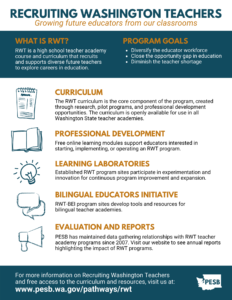Program goals
The overarching goal of the Recruiting Washington Teachers (RWT) program is to “grow our own” diverse group of future teachers who more closely reflect the population of today’s children and youth. RWT is a Washington high school teacher academy program, founded in equity pedagogy, that helps students to explore cultural identity and educational opportunities through the lens of the teaching profession.
View our RWT fact sheet (English | Spanish).
By supporting participants as they complete high school, apply to and attend college, RWT strengthens the pathway from high school to teaching, with the goal that students will become not only certified teachers, but also education leaders who make a difference in their communities.
Bilingual Educators Initiative
The Bilingual Educators Initiative (BEI) works to address the same goals as RWT, with a focus on recruiting, preparing, and mentoring bilingual high school students to prepare them to become future bilingual educators.
Curriculum and resources
Inspired by the effective practices of the original RWT pilot programs first eight years (2007-15), and charged by a special proviso from the state legislature (ESSB 6002), the Professional Educator Standards Board commissioned a task force to revise and develop the model framework and curriculum for high school Careers in Education courses to incorporate standards of cultural competence, new research on educator preparation, as well as curriculum and activities from the RWT program. This work resulted in the RWT teacher academy curriculum, for use in all Washington State teacher academies. View curriculum and resources.
Grantees
PESB supports four grant-funded learning laboratories with a focus on the recruitment and preparation of a diverse group of high school students for future careers as educators. RWT program sites allow for the testing of new resources and strategies and provide an opportunity to study program outcomes.
Contact us
For questions about the Recruiting Washington Teachers program, please contact us at pathways@k12.wa.us.


